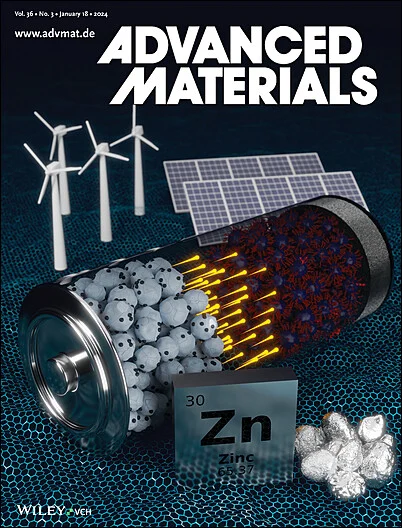高性能锂硫电池的阴离子调节。
IF 27.4
1区 材料科学
Q1 CHEMISTRY, MULTIDISCIPLINARY
引用次数: 0
摘要
锂硫(li -硫)电池具有高能量密度和成本效益的特点,是锂离子电池的主要候选材料。然而,关键的挑战仍然存在,主要是由于多硫化物(PS)阴离子穿梭和锂金属阳极(LMA)的不稳定性。盐阴离子在电池中是不可缺少的,它影响大块电解质的基本性质(如溶解度、稳定性和离子电导率)和电极-电解质界面。除此之外,阴离子的固有特性在锂硫电池中尤为重要,因为PS阴离子是直接决定硫氧化还原动力学和可逆性的主要活性中间体。然而,阴离子的调节需要进一步研究,特别是根据锂- s化学。在此基础上,提出了锂离子电池阴离子工程的基本考虑。通过综合分析,综述了阴离子的电化学行为。然后,综述了近年来国内外在负离子调控方面的研究进展。详细讨论了硫阴极中PSs的溶解、吸附、转化动力学和途径。综述了负离子对锂离子在LMA中的扩散动力学、SEI的形成和防腐性能的影响。最后,对阴离子研究的未来发展提出了见解,旨在为Li-S电池找到更合适的阴离子。本文章由计算机程序翻译,如有差异,请以英文原文为准。
Anion Regulation for High-Performance Lithium-Sulfur Batteries.
Lithium-sulfur (Li-S) batteries, characterized by their high energy density and cost-effectiveness, are the primary candidates for lithium-ion batteries. Yet, critical challenges persist, largely owing to the polysulfide (PS) anion shuttle and the instability of the lithium metal anode (LMA). Salt anions are indispensable in batteries, which influence the basic properties of bulk electrolytes (e.g., solubility, stability, and ion conductivity) and the electrode-electrolyte interphases. Apart from those, the intrinsic characteristics of anions are of particular importance in Li-S batteries, as PS anions are major active intermediates that directly determine the sulfur redox kinetics and reversibility. However, the anion regulation needs further investigated, especially according to the Li-S chemistry. In this regard, fundamental considerations are provided on the anion engineering of Li-S batteries. Through a comprehensive analysis, the electrochemical behaviors of anions are reviewed. Then, the recent works on anion regulation for cathodes and anodes are summarized. For sulfur cathodes, the PSs dissolution, adsorption, conversion kinetics, and pathway are discussed in detail. For LMA, the influence of anion on lithium diffusion kinetic, the formation of SEI, and the anticorrosion are summarized. Finally, insights into the future development of anion studies are provided, aiming to identify more adequate anions for Li-S batteries.
求助全文
通过发布文献求助,成功后即可免费获取论文全文。
去求助
来源期刊

Advanced Materials
工程技术-材料科学:综合
CiteScore
43.00
自引率
4.10%
发文量
2182
审稿时长
2 months
期刊介绍:
Advanced Materials, one of the world's most prestigious journals and the foundation of the Advanced portfolio, is the home of choice for best-in-class materials science for more than 30 years. Following this fast-growing and interdisciplinary field, we are considering and publishing the most important discoveries on any and all materials from materials scientists, chemists, physicists, engineers as well as health and life scientists and bringing you the latest results and trends in modern materials-related research every week.
 求助内容:
求助内容: 应助结果提醒方式:
应助结果提醒方式:


